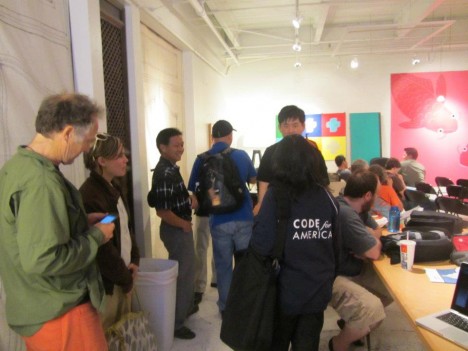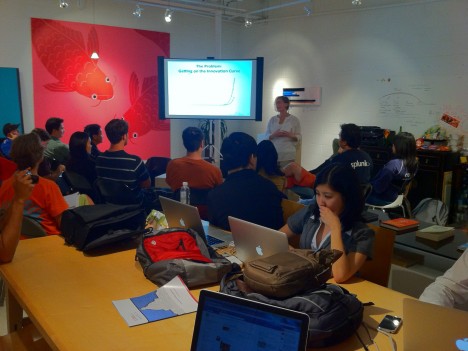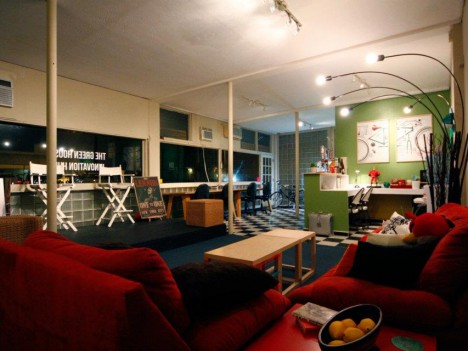These coworking spaces are taking full advantage of new technologies that allow independent workers to work when - and where - they like. While it is true that any city could be considered a holiday destination (Paris, Melbourne and New York all offer a myriad things to see and do for the intrepid traveler) small tropical islands are synonymous with ‘getaways’ whose main industry is often tourism. For this reason, coworking spaces found on small islands are positioned to offer an all together different work-vacation experience, and the trend is getting trendier.
The Work-Vacation Paradox
The trend is an interesting one, and challenges a number of ‘traditional’ views concerning the work/vacation distinction and the sense of coworking communities. The first value which is turned on its head is the work-vacation paradox: most people travel to forget about work projects and leave clients and emails behind. Would work ruin an otherwise good holiday?
Advocates assure that this is not the case, pointing to the fact that there are different types of vacationing, including those holidays taken by professionals in order to work more effectively and make the most of time spent away from their laptops.
Elena Martínez Purriños, co-founder of Coworking Nomad in Tenerife, Canary Islands, distinguishes between vacations and working-holidays. ‘This type of coworking,’ Purriños said, ‘is for a slightly different situation. [For example,] I’m working in Berlin. I haven’t any meetings this month or for the next two weeks, It’s January and it’s cold.. why not? Why not go to another place? Perhaps I’d like to practice my Spanish, I’d like to get to know Tenerife - it’s a different situation. You’re working, but you want to do something more.’
Rechung Fujihira, CEO of The Box Jelly in Honolulu, shares this opinion. In February, a Box Jelly team took a number of European coworkers and the Code for America fellows to the Hawaiian North Shore. When they weren’t working, they went kayaking, stand-up paddling and grazed at the farmers’ market.
These types of coworking spaces are helping to redefining what it means to work: we no longer need to escape our workplace, but we can use the fact that we are increasingly mobile and independent to our advantage. It really is possible to work where and when we like. If work has an increasingly smaller, or inversely, positive, impact on what we do in our spare time, we are moving closer and closer to the ideal work-life balance. Indeed, taking a work-vacation means that time away from the laptop becomes quality time. Fujihira feels exactly this.
‘Our motto at The Box Jelly is ‘work the way you live’. We are 100% advocating work-life balance here in Hawaii,’ he said.
The Transient Community Paradox
Despite the potential for these types of coworking spaces to create a harmonious work-life balance for individuals, the coworking enthusiast may look at this trend with a degree of skepticism. What about the existing community? Surely having a consistent flow of transient workers will undermine efforts to create a strong community – the essence of most self-described coworking spaces and the most sought after element for the people who work in them.
Cofounders of coworking spaces in remote travel destinations, though, find that the opposite is true. Having a flow of coworkers from different backgrounds, cultures, and work ethics enriches the dynamism of the community, and increases the potential to share knowledge and resources.
Also in Honolulu, the Greenhouse Innovation Hub appreciates traveling workers for their diverse experiences, which can contribute to the Greenhouse’s own community. Founder John Garcia has searched for ways to use the location as a way to attract visitors to the space. ‘We’re making a targeted effort to offer traveling entrepreneurs a place where they can plug-in and work during their vacation, making Hawaii a destination for technology, innovation and a coworking / incubation / shared workspace hub. [It is] a way to enrich our industry and share their experiences with the community,’ Garcia said.
‘We feel that Hawaii will become a top destination for coworking and a hub for communities to support a groundswell of innovation and creativity for many years to come.’
The Box Jelly also embraces the travelling worker, and Fujihira is passionate about the idea. ‘We love coworkers from across the Pacific. It creates a great chance for an exchange of ideas that both the Hawaii local coworkers and holiday-makers learn from. Last week we had a coworker from Germany [give a talk on] doing business within his community. We've done this in the past as well. Again sharing ideas and skills. One of the greatest parts of coworking!’
Coworking Nomad on Tenerife in the Canary Islands is exploiting the desire for work-life balance and the benefit it will bring to the community. They are in the planning stages of creating ‘Nomadic Worker Packages’, which will offer visiting coworkers a desk and a room in another local coworker’s or entrepreneur’s home for an all inclusive price. By living with other locals, these nomadic workers will have direct connections to the Tenerife community, and can impart their knowledge, skills and values in an integrated way.
‘We call these people nomadic coworkers. We have a promise to attend to them. Not only in the coworking space, but also in the afternoons, weekends, evenings. To offer them a real life. Because we want to meet people. And in the end, us and them will make contacts, other opportunities and who knows what else,’ Elena said.
To Market, To Market
Whether coworking spaces in holiday destinations are frequented by travelling coworkers depends partly on how they market themselves. Coworking Las Palmas, for example, is a coworking space in the sunny and touristic Canary Islands. Travelers are not ‘targeted’, though, and as a result, number of vacationers spotted in the space from time to time is no larger than in coworking spaces in other big cities. Nonetheless, Javier Gallego of Coworking Las Palmas feels that hosting foreign coworkers is beneficial, as the local community is rewarded by the exchange of ideas and inputs for new opportunities, assuring that ‘the feedback has been very positive from everyone.’ Like Coworking Nomad, Coworking Las Palmas is a part of ‘ñ Coworking’ – the Spanish coworking visa program – which aims to increase the flow of coworkers in all Spanish coworking facilities.
On the other end of the spectrum, CocoVivo located on the Southern part of the island Bocas del Toro, Panama, expressly targets holiday-makers. The coworking space provides office amenities and spacious on-site accommodation for the whole family on a remote part of the tropical island. Its website lists all the outdoor activities vacationers can engage in and provides a detailed description of what coworking travelers should pack.
The increasing demand for such spaces will likely be met with an increase in supply. The Box Jelly is already planning to open a space of the North Shore of Oahu sometime this year. The location will be less than a minute’s walk from a secluded beach; a place for focusing on work, balanced with beach-relaxation. Fujihira insists that there is something special about coworking in Hawaii. 'It's a lifestyle. Work the way you live.’
Whether they attract hoards of vacationing coworkers or not, these coworking spaces are similar beyond their geographical location. Their founders share a deep passion for the communities they live in, and possess great enthusiasm for sharing their local culture with the rest of the world. Each is eager to share their quality of life with visitors, and are equally open to the new ideas and knowledge from elsewhere. This type of niche coworking space satisfies the demand of workers looking for a harmonious work-life balance, and exploits the technological advancement which allows this model to exist. They are developing ways to enrich their own communities, and the coworking vacationers who frequent these spaces are having their cake and eating it too.
:::
Find coworking spaces in holiday destinations on Deskwanted.





















